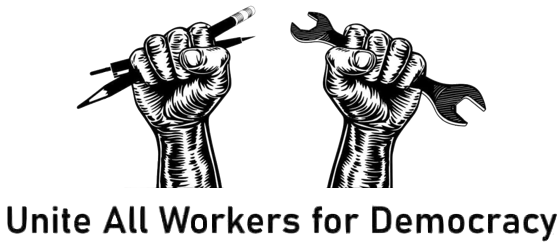Reject Electric Vehicle Tiers
UAWD Priority resolution for
the 2023 Bargaining Convention
Resolution to Reject Electric Vehicle Tiers
Under the UAW Master Agreement
As the transition toward electric vehicles accelerates, corporations are using it to weaken our union. We must organize to reject the creation of new EV tiers, and bring all new EV plants under the UAW master agreement.
Update: At the 2023 Bargaining Convention on Tuesday, March 27, the vote to debate this resolution on the convention floor failed. The resolutions committee report that was passed at the end of the Bargaining Convention did not discuss this issue.
Background
- The national transition to electric vehicles (EV) is well underway. Big Three automakers have been retooling current plants and building new EV plants to reach federally-set 50% EV production goals by 2030.
- Big 3 efforts are being supported by billions of dollars in the form of government subsidies (e.g. Inflation Reduction Act).
- From policy inaction and without aggressive labor organizing, the Economic Policy Institute estimates a rise in EVs to 50% of domestic auto sales by 2030 could see losses of roughly 75,000 U.S. jobs
- Job cuts will result in large part a result of 30% reduction in hours per unit, as claimed by Ford and other auto manufacturers
- Meanwhile, Big 3 automakers and others in the EV industry are using electrification to circumvent long standing wage, benefits, and safety protections for UAW Members.
- So far, we have seen:
- New plants, such as the new Ford battery plant in Marshall, Michigan, being brought on not under the master agreement and with relatively lower wages and benefits.
- The formation of joint ventures to embed tiered pay rates, such as Ford’s $7 billion “mega campus” in Tennessee with a South Korean battery maker.
- Sudden plant closings and relocation offers used to divide workers.
Opposition from the Administration Caucus
- Decades of concessions and lack of militant organizing has meant that the UAW thus far has no EV organizing strategy.
- The AC has stood on the sidelines as EV battery makers hire thousands of workers at sub-union wages.
- The AC has failed to organize new entrants in the U.S. electric vehicle market, including Tesla and Rivian.
- The AC has not held the line that joint ventures should be UAW jobs.
- Instead of demanding that new Big 3 EV plants be brought under the master agreement from day one, Chuck Browning and the AC are relying on card check, thereby ceding to the companies that EV jobs are different jobs.
Why Rejecting ev tiers matters
- Without aggressive rank-and-file organizing — including strikes, if need be — Big 3 manufacturers will set a pattern for an EV tier that will be harder to undo in future rounds of negotiation.
- For internal combustion engine (ICE) workers, what’s at stake is: plants are closing and being retooled without a guarantee that workers will get to keep their job, and not have to relocate their families to new cities.
- Meanwhile, current or future EV workers at Big 3 EV facilities can be making up to several dollars per hour less than other new Big 3 workers.
- The 2023 Master Agreement will set the tone for decades. Halting the creation of EV tiers is in the interest of all auto workers: Both because the EV transition means that workers will be in EV jobs in the future and the rejection of new tiers prevents the erosion of pay and benefits for all workers now
- For all UAW members: the transition to electric vehicles is not just an issue for workers, but one that concerns our entire planet. Decarbonizing transportation (which is 30% of emissions) is crucial if we want to avoid catastrophic climate change. But if we let the companies lead, they’ll continue to put profits over the environment and over workers.
- We must demand that:
- Bargaining contracts must reject EV tiers
- UAW must take the position that all joint venture jobs should be covered by the Big Three master agreement
- The UAW must organize within the Big 3, as well as joint ventures, being ready to strike when necessary to demonstrate our power to management.
- In short, we all have a stake in the EV provisions of the upcoming Big 3 Master Agreement. This should be a transition that unifies workers and helps them prosper, not one that further divides workers to benefit the nation’s wealthiest investors.
Draft Resolution
Whereas, the electric vehicle (EV) transition is well underway, and the Big Three automakers have been retooling current plants and building new EV plants, as well as, with the support of the federal government, investing billions to reach 50% EV production by 2030.
Whereas, companies are using the transition to EV production as a way to outsource jobs and divide workers by creating joint ventures, introducing a new tier specifically for EV workers, and stripping auto workers of hard-fought pay and benefits.
Whereas, new workers at Big Three EV facilities, jointly operated with other corporate entities, are in some cases already making a much lower rate of pay and receiving fewer benefits than other Big Three workers. For plants slated to open in the future, management is projecting relatively lower wages and benefits.
Whereas, halting the creation of EV tiers is in the interest of all auto workers: Both because the EV transition means that workers will be in EV jobs in the future and the rejection of new tiers prevents the erosion of pay and benefits for all workers now.
Whereas, the UAW must reject the creation of a new EV-specific pattern agreement that establishes a new “EV tier” and fight for inclusion in the master agreement of all EV workers in the Big Three and at joint ventures.
Therefore be it resolved, the UAW shall reject management proposals for contract language that excludes jobs at new Big Three electric vehicle assembly, battery, powertrain, parts, and other manufacturing plants from the Big Three master agreement, striking if necessary to achieve these goals.
Be it further resolved, the UAW’s initial proposal during bargaining will include these EV jobs within the Big Three master agreement.
Be it further resolved, the UAW must take the legal position that all joint venture jobs should be covered by the Big Three master agreement, thereby rejecting the creation of EV tiers across the auto industry and establishing a uniform pay and benefit structure equal to that of traditional auto manufacturing. To bolster that position, the UAW must organize joint ventures to demonstrate our power to management.
Be it further resolved, this effort should be part of a UAW-wide strategy to reject tiers of all kinds in all management proposals.

2023 Convention
Unite All Workers for Democracy (UAWD) is a grassroots movement of UAW members united in the common goal of creating a more democratic and accountable union.
Follow what we're fighting for at the 2023 UAW Bargaining Convention.
Get updates
Free online classes and news for UAW members
CONTACT US
uawdemocracy@gmail.com

